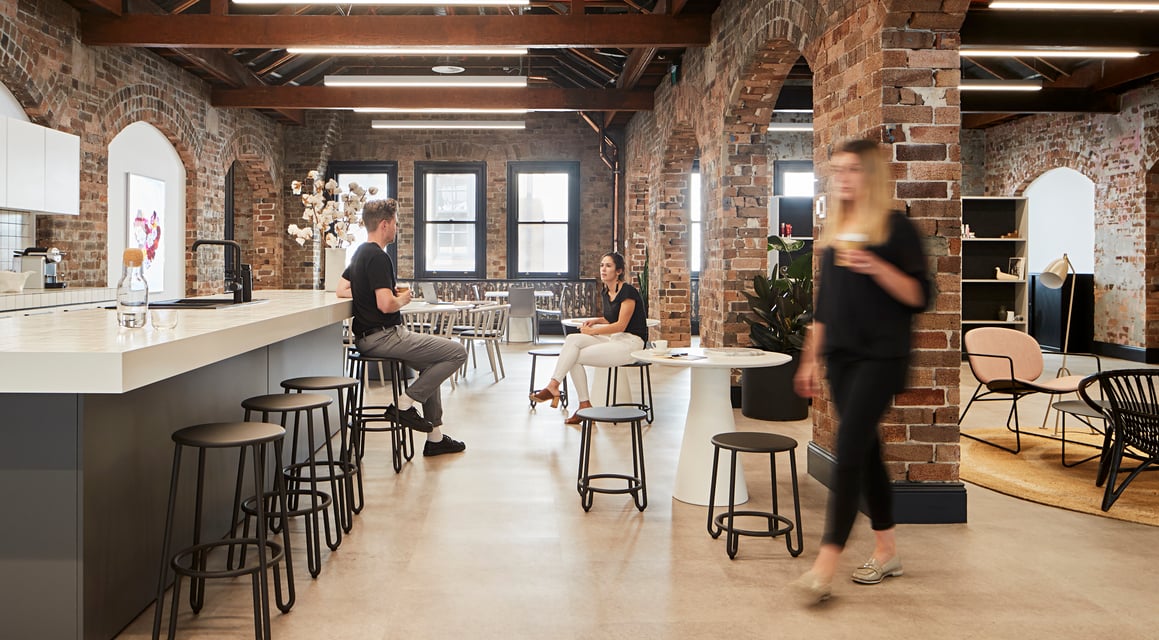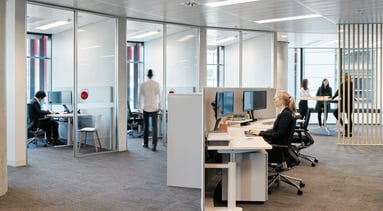
We talked to over 270 executives around the world about the impact of COVID-19 on their future workplaces. They repeatedly mentioned business culture as a major concern: they’re as worried about maintaining their culture as they are about productivity. So how can the future workplace help to sustain and promote culture?
Three of our core beliefs, before we begin:
- You may not notice your culture much, until it starts to break down
- ‘Workplace’ is no longer synonymous with ‘office’. In future, it will be a distributed blend of home, office, and even hubs or coworking spaces
- The ‘post-COVID’ workplace doesn’t exist (yet), because the virus is set to be around for a while yet – therefore, so will that blended work pattern.
Why does corporate culture matter?
Culture is where spirit, vision, values and behaviours come together in a shared understanding so strong, it manifests as a distinctive personality. Ideally, it becomes tribal: it attracts people, bonds them together, unites them towards a common goal (or against a common enemy), and improves decision-making.
Until now, businesses have relied on the office community as one of the most tangible sources and expressions of culture. Some of it develops organically, and some is engineered through good management. But if people aren’t physically meeting, or as often, or as closely, what then? Technology can connect us, but it can’t do everything: new strategies are required. Part of that strategy is how the workplace is designed – and that will need to change as we live with COVID-19.
“Significant investment in brand and culture simply can’t be lost – it matters too much. There’s a big role for the redesigned office in both maintaining and enhancing your culture, but there are practical change management strategies, too. We’ve got plenty of tools and tips here at Unispace, and the beauty of it is that we’re already practising them ourselves, so we know what works.” says Charles Hales, Global CEO.
The future role of the office for culture
Unispace’s new framework for the future workplace, Propeller, takes culture fully into account. Yet it offers a blended way of working in which the individual remains at home for focus, wellness and learning, but is drawn (as part of a team) to the office for experiences of problem-solving, innovation – and community.
We’d love to tell you more about Propeller, so sign up to an upcoming webinar.
“Thankfully we didn't proceed with our workplace changes before COVID. Propeller has completely changed the way we’re thinking about workplace."
FMCG client.
The future role of the headquarters
The corporate HQ may become less of a workplace and more of a flagship where brand and culture are most powerfully expressed. Perhaps a place that is porous to clients, academic institutions, coworking, community groups – and employees, when the occasions fits. The concentration of culture here will enable businesses to generate strategies for both drawing people in and sending culture out.
Some companies never had HQs even before COVID-19 (or any offices at all, for that matter). Automattic – which owns WordPress – has 1,216 people in 77 countries, but no offices as such. 48 of their people are spread around the UK, but only 7 are in London. This can be an engineered, but welcome, part of the culture. Some companies, like defence and intelligence firms, need people to share and mix less, and the design of the workspace will be critically important there, too.
Is the home a culture ‘black hole’?
The coronavirus pandemic proved the ups and downs of working from home, with many people now preferring it. One thing they miss is the sense of unity, and social aspects of work: there are no handshakes, hugs or team huddles. Management will need to pay attention to regular virtual check-ins for wellness, employee concerns and, crucially, inclusion. Virtual happy hours – arranged by management rather than peers – can do wonders for culture and morale. Don’t forget that the freedom to work well from home can become a strong part of your culture, embodying trust.
The role of inclusion in business culture
Culture is nothing without people, but people can get left behind when they’re not physically present. This can hinge on their personality type, seniority, or length of service. On video calls, if their face isn’t seen (if they don’t contribute, or Wi-Fi is poor), it’s as if they’re not there. Those who are quieter/more junior may even be forgotten, excluded, or passed over. That’s why management must be by engagement, not line of sight. How can spaces and experiences in the office celebrate the contribution of all? How can each person be valued – and validated – in new or adapted ways? How can technology, like pulse surveys, ensure that everyone’s voice can be heard?
The role of change management
Today, effective managers are out front and centre, communicating continually and consistently with their teams and customers. But so unprecedented are our times that even the best managers may need an expert helping hand.
Unispace recognises that workspace and real estate executives are urgently looking for a future workplace strategy. We believe Propeller is that radical, flexible and effective model. But implementing any strategy – including Propeller – is likely to fail unless the whole business is helped to understand it, adopt it, support it, and make it work for individuals and for the business.
Why not give us a call? It costs nothing to have a conversation.


